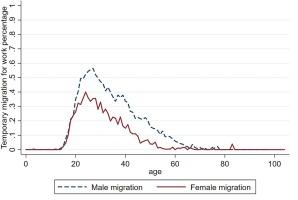性别失衡与临时迁移:来自中国农村的证据
IF 5.4
1区 经济学
Q1 DEVELOPMENT STUDIES
引用次数: 0
摘要
本文探讨了性别比失衡(男性多于女性)如何影响中国县域层面的个人临时迁移决策和总体迁移趋势。由于中国的独生子女政策、强烈的重男轻女观念和产前性别选择,农村地区未婚男性过剩,导致婚姻伴侣竞争加剧。为了提高婚姻吸引力,未婚男性和有未婚儿子的家庭有动力迁移到城市地区并积累财富。利用具有全国代表性的中国家庭收入调查和人口普查数据,我们发现,当地性别比每增加一个标准差,农村未婚男性临时迁移的可能性就会增加 3.6 个百分点。此外,县级层面的证据表明,当地性别比的上升可以解释 2000-2010 年间农村人口向城市临时迁移增加的约 25%。本文章由计算机程序翻译,如有差异,请以英文原文为准。

Gender imbalance and temporary migration: Evidence from rural China
This paper examines how sex ratio imbalance (more males than females) affects individual temporary migration decisions and broad migration trends at the county level in China. Due to the country’s one-child policy, strong son preference, and prenatal sex selection, rural areas have a surplus of unmarried males, leading to intensified competition for marriage partners. To enhance their attractiveness for marriage, unmarried males and households with unmarried sons have incentives to migrate to urban areas and accumulate wealth. Using data from a nationally representative Chinese household income survey and population census, we find that a one standard deviation increase in the local sex ratio raises rural unmarried males’ likelihood of temporary migration by 3.6 percentage points. Additionally, county-level evidence suggests that the increase in the local sex ratio can account for about 25% of the increase in temporary rural–urban migration during 2000–2010.
求助全文
通过发布文献求助,成功后即可免费获取论文全文。
去求助
来源期刊

World Development
Multiple-
CiteScore
12.70
自引率
5.80%
发文量
320
期刊介绍:
World Development is a multi-disciplinary monthly journal of development studies. It seeks to explore ways of improving standards of living, and the human condition generally, by examining potential solutions to problems such as: poverty, unemployment, malnutrition, disease, lack of shelter, environmental degradation, inadequate scientific and technological resources, trade and payments imbalances, international debt, gender and ethnic discrimination, militarism and civil conflict, and lack of popular participation in economic and political life. Contributions offer constructive ideas and analysis, and highlight the lessons to be learned from the experiences of different nations, societies, and economies.
 求助内容:
求助内容: 应助结果提醒方式:
应助结果提醒方式:


